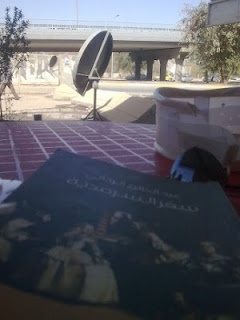I have translated the title of the novel in a previous post
as "The Passion Bearer" but while contemplating the edition I found
that Al-Mada publication Company had already translated the title to "The
Spellbound".
His souvenirs from the last war were multiple small shells of a military-airplane bomb resting inside his skull that left him with frightening auditory hallucinations. That was enough for his family (mother, brother Ismail, and sister Zainab) to isolate him more than before, he, the lover of books, the detester of violence, who was called sarcastically by his brother Ismail as: Gandhi. His mother fells disgusted when find him close to his sister talking about literature. He used to talk to his sister about the books he read and advice her about reading them. His mother allured that she thinks he is a homosexual when one day she found him talking to his sister Zainab.
The protagonist is unnamed in the novel. His only friend,
the psychiatrist, whose father had suicide, carries the name: Nadir Salih, an
Arabic name that can be literally translated to English into: "Rare
Good".
Our protagonist is not only unnamed but his small family had bribed a lawyer and edited a death-certificate for him, so that they can take his few meters of land, left to him by his dead father, in the south of Iraq.
His friend, the psychiatrist, failed to offer him, and his
auditory hallucinations, but a crazy night of binge drinking of alcohol with
the strange sexually-provocative disinhibited wife of the psychiatrist who is
named Niran (can be translated literally into: "Fires"), and a
reckless car driving that ended in a fatal car accident.
After that accident the last chapter started and it is
written by the protagonist's sister, Zainab. The chapter is actually a letter
written to our protagonist reminding him, thankfully, of the time that he spent
with her (his sister) and his advices. She mentions, for example, that day when
he advised her to read "Les Yeux D'Elsa" by Aragon, who wrote this
poem to his wife, and Zainab mentions her difficult life with her brute
husband, the smuggler. She seemed to regret her marriage to that smuggler who
played the role of the manhood in the eyes of her mother and brother Ismail
against our protagonist's peace-loving "femininity". Zainab tells about her longing to her brother and she questions if he still.. exists!
It is a novel about the struggle of the peace-lover,
art-lover, humanistic person, in an ignorant brute society where manhood is
equalized with aggression and savagery. Politeness and calmness would be seen
as cowardice, and any male who would not be a beast would be regarded as a
homosexual, even by his brother, or more strangely, his mother, while the
father, as in another novel by Ahmed Khalaf, is absent, or dead, or even… committed suicide.
Author: Ahmad Khalaf
Title: The Spellbound
Al-Mada P.C.
First Edition: 2005
Copyright to Al- Mada












